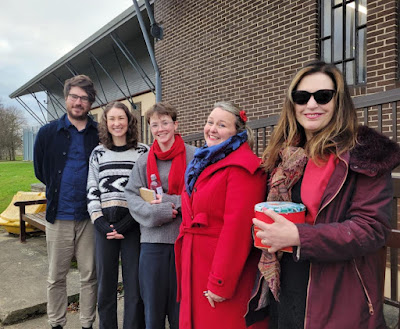Tonight I’m driving with my colleague in all things, Professor Arlene Holmes-Henderson, to teach for a week in a prison, our PhD student Katharine Russell assisting. This is our third such institution, selected with our partner Novus Education, in nine months. We’ve honed our course in response to lucid feedback from our highly engaged and intelligent students, which you can sample on the Against the Lore Podcast.
We started out doing a general course in Classical
Civilisation/Ancient History, about half of which was practical ethics in an
Aristotelian vein. But almost all of them voted for more moral philosophy and
fewer emperors, statues and inscriptions. Everyone also LOVED performing the play.
For the men’s prisons we have already taught in, we
chose Sophocles’ Philoctetes, basically the story of a guiltless man
stuck in solitary confinement for a decade by cruel and perfidious ‘comrades’.
The discussions after the (outstandingly vigorous) performances led by Drs
George Gazis and Rosie Wyles, have addressed rage, revenge, despair, sticking
to principles and the difficulties men have sorting out power hierarchies in
institutions like armies…and prisons.
 |
| With Rosie, Katharine and Arlene |
This week is our first women’s institution, and we are
doing Antigone. Standing up to horrible patriarchs, unjust punishments,
bereavement, loyalty to family, problematic sisters, suicide… I’ll have more to
report on that next week.
Teaching these students is emotionally exhausting. The
whole process is making me more than ever convinced that our current penal
system is inappropriate to the point of lunacy. A huge proportion of our (voluntary)
attendees were in care as children and thrust out to fend for themselves at 18.
They are bored out of their minds, often locked up in cells for 20 or more
hours a day, with only the brain-wrecking daytime TV for stimulation.
Learning to cook or plaster walls for a living--courses to which most prisoners do have access--doesn’t feed the intellect, the imagination or the soul. What Aristotle offers is help with planning how to become the best version of themselves that they would have been if their potential and teleological journey to self-fulfilment had not been derailed by inadequate or non-existent love, approval, education, guidance and/or stimulation in childhood and adolescence.

